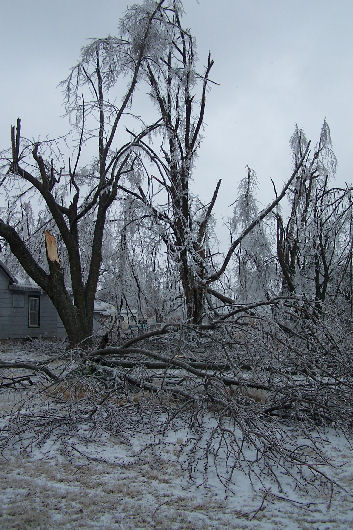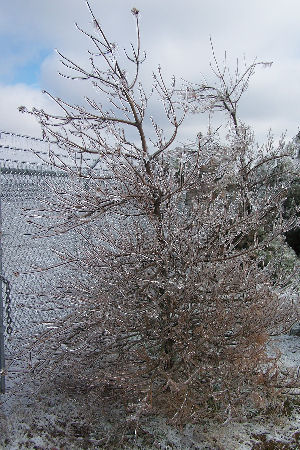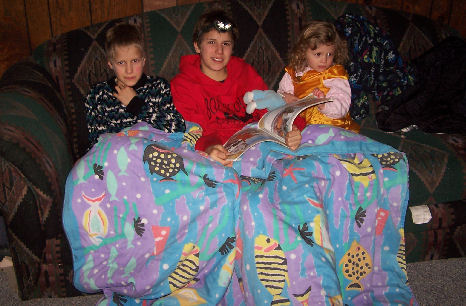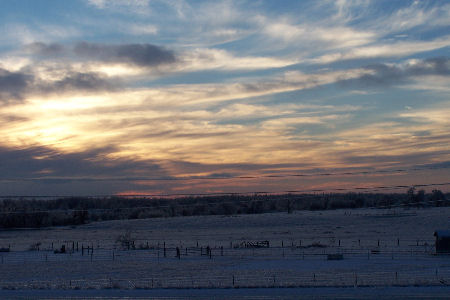 Mikes Place
Mikes Place
By
Michael L. Craner
Surviving the
Storm
As I begin writing this, we are in our ninth day without
power, situated on a ridge in the Ozarks, surrounded by trees that are finally
beginning to thaw and cast off the ice that has held them in a death grip for
over a week.
The landscape is devastated. The once mighty oaks that made
up such a beautiful view and shrouded our log home from view of the winding
country road below are now shattered. Great limbs lie about, some still encased in ice.
Some trees simply fell over, uprooted by the weight of the ice, others broken
off twelve feet up.
below are now shattered. Great limbs lie about, some still encased in ice.
Some trees simply fell over, uprooted by the weight of the ice, others broken
off twelve feet up.
We were fortunate that none fell onto the house or
penetrated the roof or walls, yet many crossed the mud and gravel lane up to the
house and had to be cut up just to get off the ridge, and more still later when
returning from town with supplies.
In the first couple of days, it was reported that over
300,000 Missouri homes and businesses were without power. Living in a rural
area, I already knew we were looking at a week at least before we saw power back
on, and that was realized the first day. The second day was when the real
devastation began.
Freezing rain and sleet accumulated on the trees, power
lines and power poles. Before long the weight of the ice was too much and as we
sat in the darkness of our home, huddled around the fireplace with just the fire
and an oil lamp for light, the mighty oaks all around us yielded to the greatest
destructive force on the planet, water, and the ice it became in the
sub-freezing temperatures.
The trees were popping and crashing all around us like
popcorn popping, only with a great deal more noise. Each moment was terrifying,
wondering if the next crash would bring one of the giants closest to the house
through the roof or walls upon us. Between the terror and the gut wrenching
sadness, knowing the beautiful trees that have shaded us in the summer, been
home to squirrels, rabbits, fox, and even Bald Eagles were being destroyed as
completely as if being fed to a giant wood chipper.
 After
about forty-eight hours, the storm's toll was nearly complete. No more rain,
sleet or snow, although temperatures wouldn’t go above freezing again until the
end of the week. I’ve written in the past about my involvement with Boy
Scouting, my oldest son is working on his Eagle right now, and my youngest boy
is in his second year of Cub Scouts. My oldest daughter is in Girl Scouts, and
my wife and I are both assistant Scout Masters, so it would hardly be in our
character to run to town to hole up in a motel or emergency shelter as many have
done. After
about forty-eight hours, the storm's toll was nearly complete. No more rain,
sleet or snow, although temperatures wouldn’t go above freezing again until the
end of the week. I’ve written in the past about my involvement with Boy
Scouting, my oldest son is working on his Eagle right now, and my youngest boy
is in his second year of Cub Scouts. My oldest daughter is in Girl Scouts, and
my wife and I are both assistant Scout Masters, so it would hardly be in our
character to run to town to hole up in a motel or emergency shelter as many have
done.
Our involvement with scouting has made us capable and
pretty well prepared to weather hard conditions, and that is what we’ve done.
After the first day I found out I was short a few water cans, so I went to town
to get some, as well as a little food, some propane and a few other supplies.
Like most, we live paycheck to paycheck and fortunately I had been paid just
before the storm struck so we had already started to restock the cupboards and
had cash on hand. It would only take a few more things and we’d be set for a
couple days at least.
When I got to the store, it was a madhouse. I managed to
secure the last water can available at that store, but it wasn’t enough combined
with the others I already had to get a family of six by for a couple days (I
felt), so I made a trip to check in on our Scoutmaster and borrow three more
water jugs if they were available. I picked up a twenty pound propane bottle,
something I had been meaning to get for some time anyway for our camping trips,
since it would be cheaper to use that, rather than the little bottles you can
buy in the store, and as it turned out the twenty pound bottles were in better
supply than the small ones anyway.
Returning home, I checked in on a couple other friends and
made sure they felt they were fine and they assured me they didn’t need anything
I could help them with. It’s easy to get caught up in your own needs in times
like this and forget your neighbors, but it’s times like this when it could be a
matter of life or death if you don’t take a few minutes to check in on them, and
they will appreciate it.
My job is maintaining a section of fiber-optic network that
is nationwide. We cater to other businesses and companies that supply
telephone, internet, and television services to consumers, and my area is one of
the two paths connecting the east and west sides of the country together. My
company provides me with a four-wheel drive truck and winch to ensure that I can
get out and do my job, so while many others had a weather holiday, I was
expected to be on the job, not just for my usual eight hours a day, but after
hours as well. This past week I spent my days (and some nighttime hours)
running portable generators to power our sites, and a refueling tank to keep the
generators running.
Not only did I have to support my family and survive, but I
also had to do my job, which was wonderful in its own right because I have been
out and about, seeing the extent of the damage, and the fantastic efforts of the
crews working to restore power. I’ve seen utility and tree service companies
from Alabama and Georgia in the area, as well as others from 60 or more miles
out of the area from Missouri out working on our lines to restore power. I am
sure there are crews from other areas but those I know for sure have been
here. I can also attest to the fact that they are working around the clock to
bring power back, men working sixteen, eighteen, twenty hour days, many who have
left their own families hundreds of miles away to come out and help us.
I borrowed a small Honda generator on the fifth or sixth
day, which is strong enough to run a couple of electric heaters, lights, alarm
clock, TV and DVD player in my bedroom, so once we got it we moved all the kids
into our bedroom. When the temperatures were at their lowest, my wife and I
shared our bed with the “baby”, who will be three at the end of February. Baby
Caitlin has been a real trooper through all of this, and surprisingly enough has
made great strides this past week at getting “potty trained”.
 The
entire experience has brought the whole family closer I believe, and taught the
children a number of skills that to this generation may seem like something from
the dark ages, but in reality, are skills my parents, and perhaps many of our
readers experienced in their day-to-day lives growing up. Skills that are all
but forgotten in many regions, I wonder how New Yorkers would survive without
power for a week or more? Probably better than if Starbucks packed up and left
town, but still, you get my point. The
entire experience has brought the whole family closer I believe, and taught the
children a number of skills that to this generation may seem like something from
the dark ages, but in reality, are skills my parents, and perhaps many of our
readers experienced in their day-to-day lives growing up. Skills that are all
but forgotten in many regions, I wonder how New Yorkers would survive without
power for a week or more? Probably better than if Starbucks packed up and left
town, but still, you get my point.
Once we got the generator online and got connected with
local news, (Most of the closest FM stations were up and down the whole time,
and they seldom provide any news anyway) I found out that Springfield (over 60
miles away) had a number of shelters set up. I have yet to hear of anything
closer available, nor or any other types of assistance available to us. As far
as I know, Springfield is the closest of any kind of relief from the conditions,
and that is just too far to go.
As I watch the closings on TV, I can understand the schools
and churches, but then I see where the “meals on wheels” programs are shut down
due to the weather… what is up with that? There is NOTHING wrong with the roads
in this region, they’re all open, clean, and dry. So why can’t they get out and
feed the elderly and infirm like usual? Seems to me this is the time those
people need those services the most.
Here are some tips we already knew or learned, but all have
been “battle tested” now thanks to the storm. Some are geared to if you can get
a generator, but still good tips for daily life anyway.
1)
Conserve resources. I can’t say this enough. Conserve your water,
conserve your batteries, and conserve your electricity. Use power saving light
bulbs throughout your house. Invest in LED flashlights and rechargeable
batteries. You can get an inverter in your vehicle that can recharge batteries,
run a laptop, or other minor things, you can recharge batteries, etc. CAUTION:
Make sure the vehicle is running or you have the means to jumpstart the vehicle
if you kill its battery.
2)
Get Water Cans/Jugs. Regardless of the situation, you need water. Get
plenty of jugs, fill them, use them. You can flush your toilet with water from
jugs, clean dishes, clean yourself, drink it, hydrate food, such as Ramen
noodles, etc. YOU NEED WATER! Conserve your water. Wash water from dishes,
body, etc is perfect for flushing the toilet, get rid of the dirty water while
flushing the toilet. If you’re doing it right, you’ll need more water to flush
than you do from cleaning/washing.
3)
DO NOT run generators or other fuel burning appliances in your home such
as stoves, heaters, etc. They give off carbon monoxide which you can’t smell,
taste, or see. You can kill you and your entire family and not even realize
it. Use these items on your porch or yard, not in your home. Make sure they
are well ventilated. Only use such appliances when they are approved for indoor
use, and then be cautious.
4)
Call your mother often, or she’ll call you! *G* Somewhat of a joke, but
really it’s not. Call your loved ones often, let them know how you’re doing.
They care, and if they’re not in the region, all they have is CNN to tell them
how you’re doing. During this storm, CNN reported more of a problem in Texas and
Oklahoma than in Missouri, and Missouri was more affected than both combined.
NEVER trust the media to tell the true story, and NEVER let them tell your
family how YOU are doing.
5)
Each kind of disaster brings its own pro’s and con’s. In an Ice Storm,
you don’t have to worry about food spoiling if you keep it where it’s cold. In
a flood you don’t have to worry about water, as long as you purify it. We have
kept food in a bedroom while the temperatures were below freezing because the
fridge is insulated; without power it becomes a thermos that keeps food warmer
than it should. Use your head and think about everything that could be an asset
or have an alternate use.
6)
Having a battery powered radio is a good idea generally, but we found
many radio stations and TV stations were losing power as well so they were
unreliable at best. I did make use of my cell phone quite a bit, and even had a
number stored for local weather forecasts which along with CNN and The Weather
Channel on my XM radio in the car kept us well informed of the weather. However
finding out about local shelters and relief was something we found very
difficult and will have to research more before the next storm.
Surviving is all about using your head and making the best
of your resources. When in doubt, ask someone else. There is no room for pride
when you are in survival mode. We’ve imposed on friends and a truck stop to
take showers. We borrowed water jugs and water, even a small generator. There
is no shame in asking for help, but only take what you absolutely need. This is
one problem we’ve faced during this storm. Some people go to the stores and buy
up all they can to get by, with no concern for anyone else, forcing stores to
impose rationing on their own.
There is no reason for this. In our situation, the roads
are more than clear enough for supply trucks to get through, there is no reason
for one person or family to buy up a palette of propane bottles or canned food
for themselves during an emergency. Be smart, think of your neighbor. Buy what
you need for a couple days at a time, and then come back. More supplies will
come. If hoarding is your game, then start now, a little at a time when
everyone else isn’t in “hoard mode”. Then when it happens, you’ll have all you
need already.
One of the activities I’ve started this week to keep my
kids occupied is making a list of items for a “bug out bag”. The idea is each
person in the family has an overnight bag prepared in the event we have to “bug
out” at a moments notice. It should have everything they NEED for two days.
Something where I can say, “Lets bug out!” and within 5 minutes we can be loaded
in the car with everything we need for two days and pulling out of the driveway.
The “Bug Out Bags” will hold things more for the owner, but
combined with a family worth of bags, they’ll be a pretty good resource. The
concept puts responsibility on everyone, and gives them purpose.
The “Bug Out Bags” will consist of a couple changes of
clothes, a pint to a quart size water bottle, wind-up flashlight, a small amount
of cash, personal info like medications, medical conditions, phone numbers and
addresses of friends and family. It should also include at the very least a
fleece sleeping bag. These roll up pretty small and can keep you comfortable
down to 50 degrees (F). It’s not a lot, but it’s a good start. Also include
travel size toiletries and a medium sized towel.
I know there’s not much in those bags, they’re meant to be
“day pack” size, or like the book bags kids take to school, but they could mean
a difference between life and death, or reuniting family members if separated.
If the bags have room left then other items could be added.
The contact and medical info is very important. When Hurricane Katrina struck, families were separated and sometimes taken to different states.
Being able to call Grandma or another 3rd party and letting them know
where you are and how to reach you can get you all back together again quicker.
In addition to the above items, my wife and I will have
other items in our bags, such as more money, spare batteries for anything we
take that might need them, backpacking stove and pot and maybe a couple
backpacking meals and an extra sleeping bag each.
Everything should be individually packed in Ziploc bag to
prevent them from getting wet, or leaking if they contain anything that would
leak, including batteries. All bags should be inventoried at least quarterly to
make sure the clothes for the kids still fit, batteries are good and not
leaking, etc. Nothing perishable should be stored in the bags, including
water. Have a water bottle, but leave it empty. You’ll find someplace to fill
it or have time to fill it before you “bug out” in most cases.
I began writing this on the ninth day without power. On
the afternoon of the 10th we finally had power back on and I’ve spent
the rest of the time catching up on work and other things (I haven’t even begun
to start cleaning up the yard yet.) It’s now January 31st and I’m
trying to hurry up and finish so it can be in this issue of Pencilstubs. Today
we got about an inch and half of snow, it’s snowing, and snow is possible over
the next 2-3 days, and guess what? We haven’t started on our bug out bags; we
have food, water, and fuel on hand and know where a shelter will likely be
that’s closer to home and work, but we’re not much better off than we were
before the ice storm.
When the kids finally got to go back to school after 12
days of being off (including the weekends), the teachers asked the kids what
they did while they were off. My daughter was the only one in her class that
stayed at home. Everyone else went to stay with friends, family, a shelter, or
a hotel. She was proud we stayed home and weathered the storm. She learned a
lot, and while it wasn’t always pleasant, we were together in our home instead
of somewhere else and we were never terribly uncomfortable.
We adapted, overcame, and survived the “Ice
Storm of 2007 on our own terms, and we’re better off for it.

Click
here for more pictures
The pictures in the gallery at the link above are but a few
examples of the devastation, most were taken within the first two days and
around or near our home. Within 15 days, nearly everyone had power
restored. The cleanup will last well into summer and beyond.
Many thanks and blessings to all those hard working
electrical crews that came out and worked around the clock to turn the power
back on.
|